Marketing Your Church Plant: Philosophical Foundations
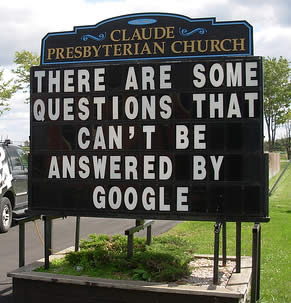
Creative commons image courtesy of flickr user au_tiger01
Would Paul use modern marketing techniques if he was planting churches today?
Did Jesus need a direct mail campaign to establish the Church in the first place? The Church was established and spread through the power of the Spirit and by word of mouth so why would we waste money on telemarketing or a smokin’ website? Why should we waste time developing relationships with social media? Is it a lack of faith? Besides, even today in the Majority World the Church is spreading much in the same way that it did two thousand years ago.
With all the talk today about “viral marketing”, we can only hope (and pray) for the kind of movement that swept through the Roman Empire in the days of Jesus and Paul. In the West in general and the US in particular, it seems like the main technique is to market a worship event through mailers, calls, websites, and tweets. The church that invests the most in these techniques will be the most “successful” (at least numerically, but there are numerous churches who used these techniques and are genuinely making healthy reproducing disciples).
A Simpler Church?
Others in church leadership are calling for a simpler approach; one that rejects all the artificial means of propagating the Gospel and focuses only on personal, intentional, authentic, and meaningful relationships. If truth be told, I lean more toward this as an extreme than to the one mentioned above. But generally these aren’t extremes. In fact, I really don’t know anyone who exclusively starts churches with mailers and billboards and I don’t know anyone who exclusively starts churches with twelve people in a living room who only go deeper and deeper together while never sharing with others outside the group.
So these are the two polar extremes that pull us as we consider how to reach our neighbors. Let’s call them the Market Driven Church (MDC) and the Relationship Driven Church (RDC). Again, no one is exclusively starting an MDC or an RDC. I only mention them here because many church starters are somewhere on the continuum in between. For example, many of the church planting books talk about the ROI (return on investment) of bulk-mail campaigns and telemarketing and offer them as tools that can be used to reach the community. However, those same church planting books spend a lot of time talking about personal evangelism and small groups and preaching and teaching, etc. The relationship focused church planting books will talk a lot about building relationships but they also talk about getting the word out to others.
Developing A Marketing Plan
But is there room for both personal, relationship evangelism and developing a marketing plan that won’t be a waste of God-given resources? More importantly, as you pray about how to reach your neighbors has God made available certain marketing techniques or is He leading you a different direction?
Just like with most things, a healthy balance of both is how many of us will answer that question. As much as I think my pull is more towards the RDC, I don’t know if ethically I could discount at least some marketing ideas.
Would anyone be opposed to having a free ad in the telephone book, a free press release for the local newspaper, or a free business listing on google? The only thing that separates those free and simple marketing tools from, say, sending a bulk mailout announcing the launch of your church is money. But money isn’t the only resource we have available to us.
So, it seems to me that we should prioritize our marketing plan around the cost, the time spent, and the expected results. Let me illustrate with a few simple graphs.

Relationships are always worth it!
To begin with, it seems that there are some things that are worth ANY amount of time spent. Relationship evangelism that is focused on getting to know people and their needs, caring for them and even sacrificing for them is maybe the highest of priorities and is highly reproducible for any follower of Jesus. Jesus spent a lot of time with the Twelve but He also spent a lot of time with the crowds! Consider the different ways that Jesus made disciples.
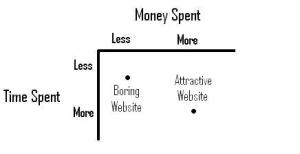
Marketing is sometimes worth it!
Are there some things that are worth ANY amount of money spent, though? Maybe not, but there are probably things that are worth SOME money spent, right? Consider how much it costs to throw up a website with no images and very little creativity (emphasis on “throw up”). Would it make a difference in my neighborhood which is filled with young professionals who are very successful, well-educated, and technologically savvy? Who am I trying to reach with a website? Maybe you wouldn’t even bother with a website in the first place? Even if a large majority of people go to work and then come home and watch TV and surf the internet and never interact with their neighbors?
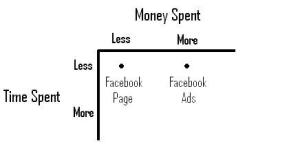
Marketing is most useful when it’s targeted and relevant!
There are some marketing ideas that cost very little money and takes very little time such as creating a facebook page or listing your church on google maps. These sorts of “techniques” create very little controversy because they are free. On the other hand, facebook ads or google ads are just as easy to create, with very little time spent, but they cost a little bit more and yet, they are more effective at getting the word out than a static facebook page. Would you consider investing in a facebook ad for your church? What if I told you that you could target that ad to only be seen by people who are searching “church” in your zip code and you only pay when someone clicks through to your church website? Does it make it more valuable?
What About ROI?
ROI (return on investment) is something else to think about. Consider the following illustrations:
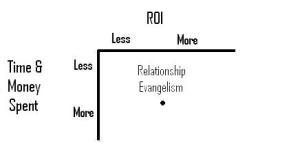
Time AND money are commodities that have limits!
In this grid, relationship evangelism does take a lot of time but maybe not so much money. The ROI is high because the quality of the relationships that have been formed is high. In this case we are investing in people who will eventually be mobilized and equipped to invest in others. Growth is exponential (we pray). Again, we can’t underemphasize the importance of relationships as we consider how to reach our neighbors.
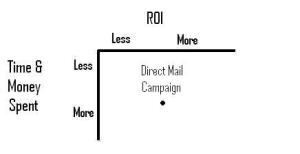
The ROI may be similar whether the main commodity used was time OR money!
But is it possible that spending less time but more money could bring about similar ROI? For example, if your church spent $5,000 on a direct mail campaign and you mailed a postcard to 5,000 homes. Assuming only 1% responds, that’s 50 people who came to your weekend gathering where you’ve just started a sermon series entitled “The Case for Christianity”. You spent 10 hours setting it up and now people in your church have a chance to follow up with 50 people. Say only 5 of them respond favorably to the Gospel and become fully mature, reproducing, followers of Jesus. Was it worth it?
Additionally, now all 5,000 households in your neighborhood know there is a church in the area! If you are advertising a practical sermon series with your direct mail campaign such as Financial Peace University where you are hoping to help your neighbors take control of their finances from a Biblical perspective isn’t the ROI even higher if people now have a more positive appreciation for your church and that you genuinely care about their needs? As a result, you now have 5,000 households that know about your church, 50 contacts for follow up, 5 new disciple-making disciples, and an increased favorability rating among your neighbors (I’m not talking about a popularity contest here, I’m talking here about your “good reputation among outsiders” – see 1 Timothy 3:7).
Final Thoughts
In my next post I want to talk about “Marketing Your Church Plant: Biblical Foundations” but I wanted to talk about philosophical foundations first to get us thinking reasonably about this issue. In other words, I’m trying to use logic to get us thinking about the issue so that we can talk about biblical principles in the next post. So, am I making sense? Do you see a way we can strike a balance between relationship-only outreach and market-driven outreach?
What sorts of marketing techniques would you consider using to broadcast your message to your neighbors?
2 Responses
Subscribe to comments with RSS.










You would also need to factor in some unknowns. For example, how many people–perhaps not even in the zip code area–might come across the web site and be inspired by the Holy Spirit to add the church to their “new churches” prayer list? This important factor would be impossible to calculate, nor would it be possible to put a value on the benefits that might result from even one person inspired and committed to get on their knees on behalf of the church and its leadership. Now, if there were two or more….
Good post, Nathan. I’ve felt for awhile that marketing is an appropriate topic for churches to discuss. In the ancient world, letters were a form of extending your presence beyond your literal person. I think tasteful marketing does the same today–it keeps the “presence” of the church in the mind of the targeted community.